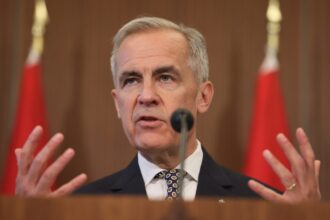As winter’s grip tightens across Canada, Southlake Regional Health Centre has issued an urgent plea to parents: protect your infants against respiratory syncytial virus (RSV) through timely immunization. The hospital’s call to action comes amid growing concerns about a potential surge in RSV cases that could overwhelm pediatric healthcare facilities nationwide.
“We’re seeing the early indicators of what could become a significant RSV season,” explains Dr. Sarah Matheson, Chief of Pediatrics at Southlake. “Unlike previous years, we now have effective preventative measures available, but too few parents are taking advantage of them.”
RSV, which typically manifests as a mild cold in adults, poses substantial risks to infants and young children. The virus can cause severe respiratory distress, bronchiolitis, and pneumonia in vulnerable populations. Health Canada data indicates that RSV hospitalizes thousands of children under age five annually, with infants under six months facing the highest risk of severe complications.
The new RSV immunization, approved by Health Canada earlier this year, has demonstrated remarkable efficacy in clinical trials, reducing hospitalization rates by approximately 80% among immunized infants. Despite this promising protection, uptake rates across Ontario remain concerning, with only about 45% of eligible infants receiving the recommended dose.
“This isn’t just about individual protection,” notes infectious disease specialist Dr. Raymond Chen. “When we immunize our children against RSV, we’re also protecting vulnerable populations throughout our communities, including elderly individuals and those with compromised immune systems.”
Southlake Hospital has implemented a multi-pronged approach to boost immunization rates. This includes extended clinic hours, mobile immunization teams serving remote communities, and comprehensive education campaigns targeting new parents. Healthcare providers are particularly focused on reaching families in underserved communities where access barriers might exist.
Pediatric nurse practitioner Amina Patel emphasizes the importance of timing: “The optimal window for immunization is before or early in RSV season. Parents shouldn’t wait until cases are widespread in their community – by then, exposure risks have already escalated significantly.”
For parents concerned about vaccine safety, medical experts highlight the extensive testing process these immunizations have undergone. “The safety profile of the RSV immunizations is excellent,” assures Dr. Matheson. “The minor side effects some infants experience are vastly outweighed by the protection against potentially serious illness.”
As hospitals across Canada prepare for what epidemiologists predict could be a challenging respiratory illness season, public health officials are reinforcing preventative measures beyond immunization. These include consistent hand hygiene, keeping sick children home from daycare or school, and limiting newborn exposure to individuals with respiratory symptoms.
The broader implications of RSV prevention extend to Canada’s healthcare system as a whole. During peak RSV seasons, pediatric units often operate beyond capacity, leading to resource strain throughout healthcare facilities. By preventing severe RSV cases, immunization could preserve critical hospital capacity during winter months when multiple respiratory illnesses typically converge.
As we navigate another Canadian winter, the question remains: will enough parents heed medical experts’ advice to protect the most vulnerable members of our society, or will we face another season of preventable infant hospitalizations?
For more information on RSV immunization locations and appointment availability, parents are encouraged to contact their primary healthcare provider or local public health unit.







